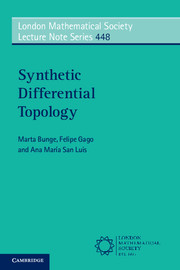PART III - TOPOSES AND DIFFERENTIAL TOPOLOGY
Published online by Cambridge University Press: 16 March 2018
Summary
In this third part we introduce and then make essential use of the intrinsic local and infinitesimal concepts available in any topos. By analogy with the synthetic theory of differential geometry, where jets of smooth maps are assumed representable by suitable infinitesimal objects, the axioms of synthetic differential topology express the representability of germs of smooth mappings, also by infinitesimal objects. However, whereas the nature of the infinitesimals of synthetic differential geometry are algebraic, those of synthetic differential topology are defined using the full force of the logic of a topos. In both cases, the use of Heyting (instead of Boolean) logic introduces an unexpected conceptual richness. To the basic axioms of synthetic differential topology we add a postulate of infinitesimal inversion and a postulate of the (logical) infinitesimal integration of vector fields. To these axioms and postulates we add others that shall be needed in the theory of stable mappings and their singularities to be dealt with in the fourth part of this book. The validity of all of these axioms and postulates in a single model will be shown in the fifth part of the book.
Information
- Type
- Chapter
- Information
- Synthetic Differential Topology , pp. 87 - 88Publisher: Cambridge University PressPrint publication year: 2018
